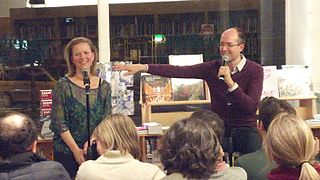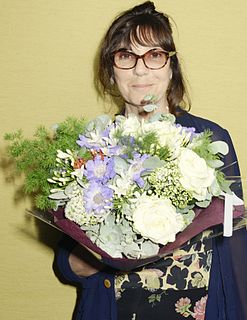A Quote by Amity Gaige
I love writing letters. In order to write a novel in first person, I think I needed an addressee.
Related Quotes
Thoughts are created in the act of writing. [It is a myth that] you must have something to say in order to write. Reality: You often need to write in order to have anything to say. Thought comes with writing, and writing may never come if it is postponed until we are satisfied that we have something to say...The assertion of write first, see what you had to say later applies to all manifestations of written language, to letters...as well as to diaries and journals
Objectifying your own novel while writing it never really helps. Instead, I guess while you're writing you need to think: This is the novel I want to write. And when you're done you need to think: This is what the novel I wanted to write feels like and reads like and looks like. Other people might call it sweeping or small, but it's the book you chose.
Well, first you have to love writing. A lot of authors love having written. But I enjoy the actual writing. Beside that, I think the main reason I can be so prolific is the huge amount of planning I do before I start to write. I do a very complete, chapter-by-chapter outline of every book I write. When I sit down to write, I already know everything that's going to happen in the book. This means I've done all the important thinking, and I can relax and enjoy the writing. I could never write so many books if I didn't outline them first.
It's more like I write multiple first drafts, handwritten. So with my first novel, I wrote whole drafts from different points of view. There are different versions of that novel in a drawer on loose-leaf sheets. I won't even look at the first draft while I'm writing the second, and I won't look at the second before writing the third.
I think that was one of the things that happened, especially in Ireland, that you left in order to improve yourself, and you couldn't write home and tell people, 'Look, I'm really lonely,' because you'd realize how much those letters were going to matter, that you needed to put good news or uplifting news into them.
I realized how valuable the art and practice of writing letters are, and how important it is to remind people of what a treasure letters--handwritten letters--can be. In our throwaway era of quick phone calls, faxes, and email, it's all to easy never to find the time to write letters. That's a great pity--for historians and the rest of us.
I had to detach myself from myself, if that makes any sense, to conjure an authentic first-person voice. In that sense, it was similar to writing a first-person novel. But I was writing about real people, not fictional ones - myself, my family, my friends and boyfriends and ex-husband, and that was extremely tricky.
After my first novel, my mother said to me, 'Why don't you make your writing more funny? You're so funny in person.' Because my first novel was rather dark. And I don't know, but something about what she said was true. 'Yes, why don't I?' Maybe I was afraid to be funny in the writing. But since then, seven books later, almost everything I've done has a comedic edge to it.







































